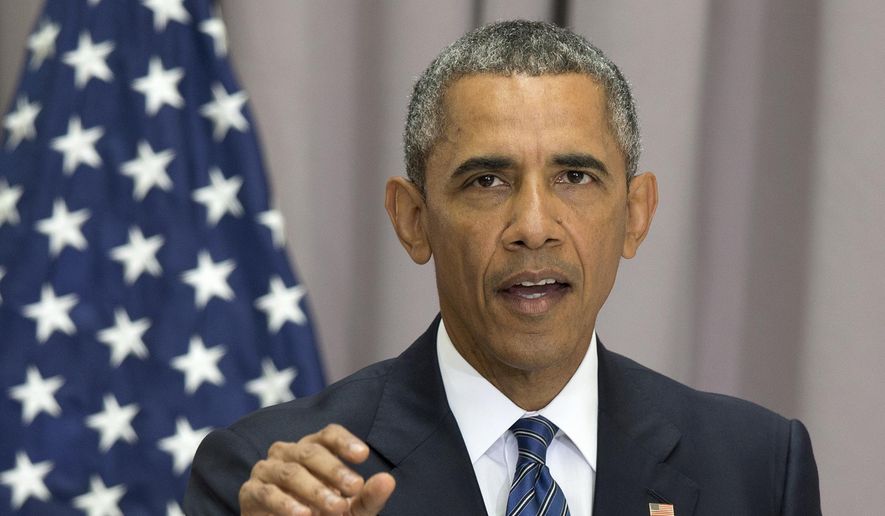President Obama’s move to limit methane emissions from oil and gas companies sparked a furor on Capitol Hill and beyond Tuesday, with critics charging the administration wants to sabotage an industry that’s created millions of jobs and powered economic growth across the country over the past decade.
The Environmental Protection Agency’s latest set of regulations, part of the president’s broader plan to fight climate change, calls on oil and gas companies to cut methane pollution from drilling sites, distribution systems and in other areas of operation by at least 40 percent by 2025. The agency admits the rules will cost the industry as much as $420 million but claims they also will deliver at least $460 million in public health benefits.
The administration argues that methane emissions are an even greater threat to the planet than carbon pollution, which also is now subject to a host of environmental regulations.
About 30 percent of total U.S. methane emissions, the EPA said, come from the oil and gas industry, making the sector a major offender in the warming of the planet.
“Today, through our cost-effective proposed standards, we are underscoring our commitment to reducing the pollution fueling climate change and protecting public health while supporting responsible energy development, transparency and accountability,” EPA Administrator Gina McCarthy said in a statement. “Cleaner-burning energy sources like natural gas are key compliance options for our Clean Power Plan and we are committed to ensuring safe and responsible production that supports a robust clean energy economy.”
The regulations come just two weeks after Mr. Obama rolled out federal rules limiting carbon emissions from power plants — a move expected to devastate an already struggling domestic coal industry and one that the government admits will raise electricity rates for most Americans.
SEE ALSO: Obama administration plans more regulations — this time on garbage, landfills
On the methane rules, critics say the EPA once again has crafted a solution in search of a problem. They point to federal data that show methane emissions have dramatically dropped in recent years despite huge increases in production — the result of better technology at drilling sites and other steps taken by oil and gas companies to voluntarily cut emissions.
“The oil and gas industry is leading the charge in reducing methane. The last thing we need is more duplicative and costly regulation that could increase the cost of energy for Americans,” said Jack Gerard, president and CEO of the American Petroleum Institute, the sector’s top trade group. “Even as oil and natural gas production has surged, methane emissions from hydraulically fractured natural gas wells have fallen nearly 79% since 2005, and CO2 emissions are down to 27-year lows. This is due to industry leadership and significant investments in new technologies. EPA’s own analysis shows that methane emissions from hydraulically fractured natural gas wells have fallen dramatically.”
Specifically, the regulations call on companies to find and repair leaks in wells, capture methane that may escape from wells, limit emissions from pumping systems and take other steps. The rules apply only to new and modified oil and gas operations, meaning many wells in operation today could be exempt unless they undergo significant renovations.
The proposal also is part of a larger EPA plan to combat methane emissions. Agency officials say other steps addressing methane are on the way.
“As we move forward, additional opportunities will be identified … That doesn’t mean we have every last one of them identified as of this moment,” Janet McCabe, EPA’s acting assistant administrator in the office of air and radiation, told reporters on a conference call.
On Capitol Hill, lawmakers are promising full reviews of the regulations. They say the administration is requiring oil and gas companies to limit methane emissions to a degree that simply may not be possible with current technology.
SEE ALSO: Obama’s Clean Power Plan faces opposition from black, Hispanic leaders
“The EPA’s plan to limit emissions flies in the face of technological reality. The truth is that while the oil and natural gas industry has greatly increased production on state and private lands, methane emissions have actually fallen,” said Rep. Rob Bishop, Utah Republican and chairman of the House Natural Resources Committee. “This proposal is another unprecedented attack aimed at federal control of our nation’s energy production, with the goal of stopping new production.”
Combined with other regulations — including rules that establish additional red tape for companies drilling on federal land — the methane rules prove the administration, despite public declarations to the contrary, wants to slow U.S. oil and gas production, said Rep. Ed Whitfield, Kentucky Republican and chairman of the House subcommittee on energy and power.
“The oil and gas industry has taken many welcome steps to deploy technologies to reduce methane emissions, but the EPA seems intent on handcuffing the industry,” he said.
Meanwhile, environmental activists are aiding the administration in condemning methane emissions from oil and gas companies. The Environmental Defense Fund, for example, circulated Colorado State University research Tuesday saying the EPA’s methane emissions estimates are far too low and that the oil and gas industry actually emits much more pollution that previously reported.
“The nation’s oil and gas companies emit over seven million tons of methane pollution every year, equal to the greenhouse gas pollution of about 160 coal fired power plants over the next twenty years. This proposal begins the important work of ensuring that the oil and gas industry reduces this pollution,” said EDF President Fred Krupp.
• Ben Wolfgang can be reached at bwolfgang@washingtontimes.com.




Please read our comment policy before commenting.